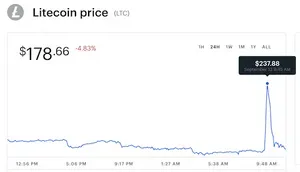Hacker steals around $55 million from bZx
Media outlets are duped into believing that Kroger will begin accepting Bitcoin Cash
Blockchain Global enters liquidation
Creditor claims are likely to exceed $50 million. The operators of the company allegedly commingled customer, investor, and company funds, and used this pool of money on personal expenses and investments in other companies. The liquidator has recommended that the Australian Securities & Investments Commission (ASIC) investigate the company's directors, Sam Lee, Zijing "Ryan" Xu, and Liang "Allan" Guo.
Oracle manipulation attack against Vesper Finance nets hacker over $3 million
BXH exchange exploited for $139 million
Creators of a Squid Game-themed token make off with more than $3 million
NFT collector scammed out of almost $1 million
Developer of "Monkey Jizz" cryptocurrency makes off with $270,000
$60 million disappears in AnubisDAO project within a day of its launch
OpenSea NFT trading platform patches a vulnerability that had allowed hackers to steal from users
A much-hyped Miss Universe NFT project turns out to be a rugpull
Rapper Tekashi 6ix9ine releases a series of NFTs, only for the project not to deliver anything it promised
DeFi platform C.R.E.A.M. is hacked for a third time, this time for $130 million
A tech startup aims to solve the real problem with the U.S. justice system: the lack of gambling involved
"Realms of Ruin", a YA storytelling NFT project, collapses hours after launch
- "Inside the Realms of Ruin", TechCrunch
- "Realms Of Ruin Storytelling NFT Collapses After 5 Hours", GameByte
Successful exploit of the CreatureToadz NFT project briefly nets a poorly-disguised hacker 88 ETH (almost $350,000)
Hacker steals $16 million from Indexed Finance
Four NFT projects on the Solana blockchain rug-pull in one day
The creator of the "Evolved Apes" NFT project makes off with $2.7 million a week after launch
Baller Ape Club NFT developers rug pull for $2.6 million
Founder of DeFi platform Compound threatens users who received mistaken payments with the IRS
An NFT project developer steals $138,000, sending images of random emojis to buyers
German government's blockchain-based ID wallet removed from app stores shortly after launch due to major issues
- "ID Wallet: The German government had long known about IT security vulnerabilities", Market Research Telecast
- "Konzeptionell kaputt und ein riesiger Rückschritt", Netzpolitik.org
Vee Finance platform emptied of $35 million a week after its launch
pNetwork loses $12 million to a bug
Supply chain attack drains $3 million from SushiSwap
Head of Product for major NFT platform, OpenSea, is asked to resign following allegations of NFT insider trading
GTV Media Group, a media company operated by Steve Bannon and Guo Wengui, pay $539 million settlement over ICO
GTV Media Group is a media company co-founded by Steve Bannon and Guo Wengui, both figures in the American far right who have close ties to Donald Trump.
- "SEC Charges Three Media Companies with Illegal Offerings of Stock and Digital Assets", U.S. Securities and Exchange Commission
Fake press release dupes media outlets into reporting that Walmart will begin accepting Litecoin
SEC charges Rivetz Corp. and related entities for $18 million ICO
- "SEC Charges Issuers and CEO for $18 Million Illegal Securities Offering", U.S. Securities and Exchange Commission
El Salvador adopts Bitcoin as legal tender
So has El Salvador itself, assuming Bukele is telling the truth about his many claimed Bitcoin purchases. As of December 2022, Nayib Bukele has lost more than $67 million on those investments.
C.R.E.A.M. Finance exploited again, this time for $25 to $30 million
xToken loses another $4.5 million in second hack of the year
Scammers posing as Bored Ape Yacht Club founders scam NFT collector Sohrob Farudi out of $800,000
Scammers posing as OpenSea support staff steal $480,000 from NFT collector Jeff Nicholas
- "The NFT scammers are here", The Verge
Liquid Global cryptocurrency exchange hacked for $90 million
A week after the hack, FTX extended a $120 million loan to the platform. In April 2022, FTX formally acquired Liquid for an undisclosed amount.
DAO Maker project exploited for more than $7.3 million
$611 million is stolen from Poly Network in one of the largest cryptocurrency heists to date
"Women-led" NFT project, "Fame Lady Squad", turns out to be a bunch of dudes
Poloniex settles with the SEC for more than $10.3 million
The US-based Poloniex was acquired in 2018 by Circle, then in late 2019 by an investment group that included Justin Sun. Sun moved Poloniex to the Seychelles and closed U.S. operations upon acquiring the platform.
Blockchain Credit Partners forfeits over $12.8 million in SEC agreement
The respondents agreed to a $12.8 million forfeiture of ill-gotten profits, plus a combined $250,000 penalty. The case marked a first from the SEC in the decentralized finance space.




































